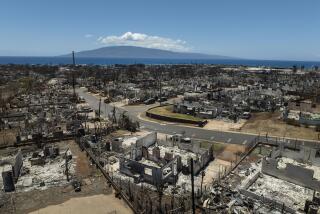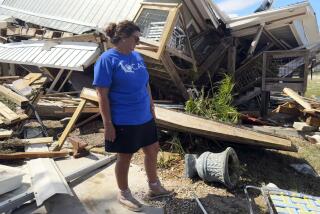Foreclosures could be used to house hurricane victims
MIAMI — Trying to make the best of a bad situation, federal officials might use foreclosed homes as temporary housing for hurricane evacuees in Florida as soon as this summer.
The proposal would keep people close to their homes and communities instead of scattering them around the country, which happened when Hurricane Katrina devastated New Orleans nearly four years ago. Thousands never returned.
But the idea is still in its infancy and many questions remain unanswered, including whether the banks that own the foreclosed homes would agree to such a plan.
“It makes all the sense in the world,” said Jack McCabe, a South Florida real estate analyst, who has watched tens of thousands of homes go into foreclosure. “We have a lot of vacant units available.”
The Federal Emergency Management Agency told the Associated Press that it might consider using foreclosed homes if hotels, shelters and other housing options were full, and only in the case of a catastrophe. The idea was discussed at a Florida hurricane drill recently.
Jeff Bryant, FEMA’s federal coordinating officer for Florida, said the agency would work with other federal agencies such as Housing and Urban Development and state emergency planners to see if it could be a solution.
If the proposal works in Florida, it could serve as a model nationally. In April, there were 278,287 homes in some stage of foreclosure in Florida, according to RealtyTrac. The idea isn’t wholly new: About 100 families were moved into foreclosed homes after Katrina, FEMA said.
“When you have a diaspora that leaves the state it’s very hard to get those guys back. You really want to prevent them from leaving the state,” Bryant said. “We want to keep them in their same local community.”
FEMA would probably contact banks, other mortgage holders and their representatives to compile a list of available homes. The evacuees would then be assigned homes close to their own, and FEMA would use a contractor, acting as its agent, to pay rent directly to whoever owns the home, said Jon Arno, FEMA’s individual assistance branch director for Florida. His duties include finding temporary housing for disaster victims.
If there is a consenting landlord and a legitimate tenant, then there should not be any legal problems, said Chris Lafakis, an economist specializing in Florida and the housing market at Moody’s Economy.com.
“I think that it should be viewed more of a moral issue,” Lafakis said, “what’s best for displaced homeowners, than as a sparkplug for Florida housing market.”
Ruben Almaguer, the interim director of the state’s Division of Emergency Management, said he wants FEMA to look into the option for this hurricane season, which began June 1.
But there could be snags. McCabe said using foreclosed homes might be too costly and complex.
“Could FEMA react quickly enough in concert with the developers and lenders to come to agreements to utilize the vacant housing units for the temporary needs of hurricane victims?” he asked.
Another problem, said attorney Roy Oppenheim, is that neighbors might not want strange families moving in. But a displaced family would be better than squatters, and he thinks banks would look favorably on the idea.
Bank of America spokeswoman Jumana Bauwens said, “We would have to see more details, but it is something we would consider.” Other banks said they would want to see plans before commenting.
Some Katrina refugees said they wish they would have had the option. Angelo Edwards, who just returned to New Orleans from Houston three months ago, said the move would help everyone.
“It provides income to the bank, the person who holds the deed. . . . It’s taking some of that inventory out of the market,” he said. “With this program they could keep that family unit together.”
Cindy Bartholomae left New Orleans with her five children and eventually ended up in North Carolina without her husband, who stayed behind to work as a deputy. When she returned to New Orleans in 2006 they lived in trailer for a year.
“If I had a place to stay that was closer, it would have been so much easier for me,” she said. “I just felt separated. My kids were lonely. They missed their dad.”
More to Read
Sign up for Essential California
The most important California stories and recommendations in your inbox every morning.
You may occasionally receive promotional content from the Los Angeles Times.









